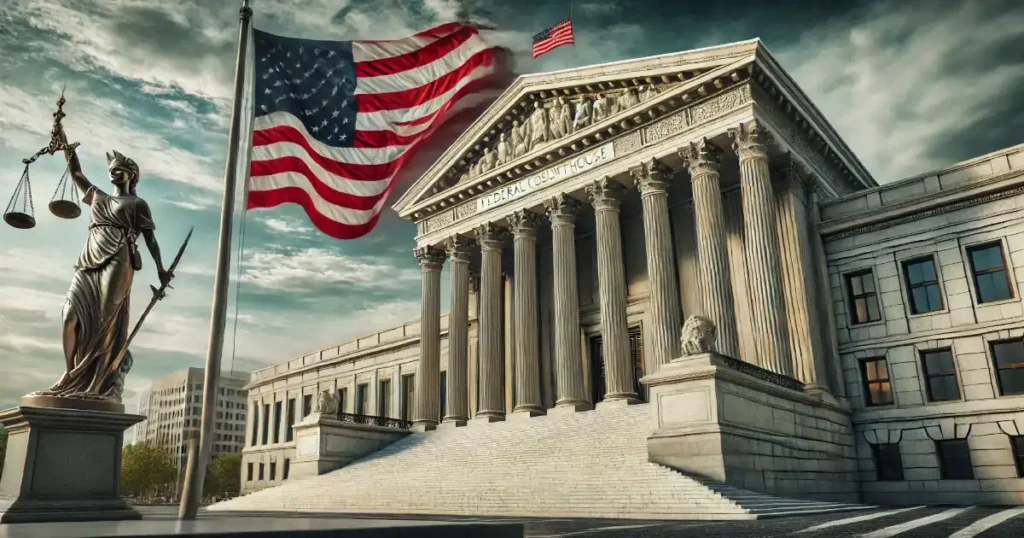I. Introduction to Appellate Court News
Appellate courts play a pivotal role in the United States judicial system, serving as intermediaries between the lower courts and the Supreme Court. These courts review decisions from lower courts, ensuring that the law is correctly interpreted and applied. They do not typically reexamine the facts of a case but instead focus on legal principles and procedural issues. This function makes appellate courts crucial in shaping legal precedents, which guide the application of law across the country.
This article aims to shed light on recent significant appellate court decisions that have far-reaching implications for U.S. law and society. By examining these rulings, we gain insight into the evolving landscape of legal interpretation and the broader impact on public policy, constitutional rights, and everyday life.
II. Major Recent Appellate Court Decisions
A. FTC Non-Compete Rule Blocked Nationwide
1. Overview of the FTC Non-Compete Rule
The Federal Trade Commission (FTC) introduced a new rule earlier this year aimed at banning most non-compete agreements between employers and their workers. The rule was designed to prevent employers from restricting workers’ ability to seek employment elsewhere, thereby promoting labor mobility and preventing unfair limitations on worker freedom. Set to take effect on September 4, 2024, the rule quickly became the subject of intense legal scrutiny.
2. Legal Challenge in Texas
In Texas, a legal challenge emerged as a federal court examined the FTC’s authority to implement such a sweeping regulation. The plaintiffs argued that the FTC overstepped its statutory authority and that the rule was both arbitrary and capricious. The court sided with the plaintiffs, issuing a nationwide injunction that prevented the rule from taking effect. The court’s decision emphasized the importance of adhering to statutory limits on agency power, reflecting a broader judicial skepticism toward expansive regulatory actions by federal agencies.
3. Implications of the Ruling
The Texas court’s ruling has significant implications for both employers and workers across the country. For now, businesses can halt their preparations to comply with the new rule, although the future remains uncertain. The FTC has indicated plans to appeal the decision, potentially leading to a higher court’s review, possibly even by the Supreme Court. If the appeal is successful, the rule could still come into force, fundamentally altering the landscape of employment law in the U.S.
B. Maryland Handgun Licensing Law Upheld
1. Background of the Maryland Law
Maryland’s handgun licensing law requires prospective handgun purchasers to obtain a license before purchasing a firearm. This process includes background checks, fingerprinting, and mandatory safety training. The law, intended to reduce gun violence, has faced multiple legal challenges since its inception, with opponents arguing that it infringes on Second Amendment rights.
2. Fourth Circuit Court of Appeals Decision
Recently, the Fourth Circuit Court of Appeals upheld the constitutionality of Maryland’s handgun licensing requirements. This decision overturned a previous panel ruling that had found the law unconstitutional. The court’s reasoning centered on the state’s compelling interest in preventing gun violence and ensuring that firearms are only in the hands of responsible, law-abiding citizens. This ruling aligns with other appellate decisions that have upheld similar gun control measures across the country.
3. Broader Implications
The Fourth Circuit’s decision has significant implications for gun control legislation nationwide. By upholding Maryland’s law, the court has reinforced the ability of states to implement regulations that they believe are necessary to protect public safety. However, this decision could prompt further challenges in other jurisdictions, especially as states and advocacy groups seek to either expand or curtail gun control measures in light of recent Supreme Court rulings.
C. Illinois Ban on Short-Barreled Rifles Upheld
1. Overview of the Illinois Law
In Illinois, state law prohibits the ownership of short-barreled rifles, categorizing them as dangerous and typically used for criminal purposes. This law was challenged on Second Amendment grounds, with the plaintiffs arguing that it infringed on their right to own firearms for self-defense.
2. Appellate Court’s Ruling
The Illinois Fifth District Appellate Court recently ruled against the plaintiffs, upholding the state’s ban on short-barreled rifles. The court’s decision was grounded in the interpretation that such weapons do not fall under the protections afforded by the Second Amendment. The ruling emphasized that short-barreled rifles, similar to short-barreled shotguns, are not commonly possessed for lawful purposes and thus can be lawfully restricted by the state.
3. Consequences of the Decision
This ruling is significant as it highlights the ongoing legal battles surrounding the Second Amendment. The decision may inspire similar rulings in other states with comparable laws, while also setting the stage for potential challenges that could escalate to the Supreme Court. The outcome of such challenges could have profound effects on gun ownership rights in the United States.
III. Trends in Appellate Court Rulings
A. Increasing Scrutiny of Federal Agency Authority
Appellate courts in the United States are increasingly scrutinizing the extent of federal agency authority, reflecting a broader judicial trend towards limiting executive power. This shift is rooted in concerns over the balance of power between the legislative and executive branches, particularly regarding how much discretion federal agencies should have in interpreting and implementing laws.
1. FTC and Beyond
The recent ruling against the Federal Trade Commission’s (FTC) Non-Compete Rule is emblematic of this trend. In this case, a Texas federal court blocked the FTC’s rule on the grounds that the agency overstepped its statutory authority. The court’s decision underscores a growing judicial insistence that significant regulatory actions must be clearly authorized by Congress. This demand for explicit legislative backing is becoming a central theme in cases involving federal agencies.
Historically, federal agencies like the FTC have been granted considerable latitude to create and enforce regulations under the authority of broadly written statutes. However, courts are increasingly questioning whether such broad delegations of power are constitutionally permissible. The Non-Compete Rule case is just one example where courts are pushing back against what they perceive as regulatory overreach. The decision in Texas could set a precedent that prompts more challenges to agency regulations, particularly those perceived as exceeding the intended scope of their statutory mandates.
This shift could have a profound impact on the administrative state, potentially leading to a more constrained regulatory environment where agencies are limited to actions that have clear and specific congressional approval. This trend is not limited to the FTC but extends to other agencies as well, including the Environmental Protection Agency (EPA), the Securities and Exchange Commission (SEC), and the Department of Labor (DOL). Each of these agencies has faced legal challenges that question the extent of their regulatory authority, and appellate courts are increasingly siding with challengers who argue that these agencies are overreaching.
2. Broader Judicial Trends
Beyond individual cases, there is a broader judicial trend towards applying heightened scrutiny to regulations that have significant economic or social impacts. Appellate courts are increasingly reluctant to defer to agency expertise, particularly in cases where the regulation in question could have widespread consequences. This trend is evident in rulings involving environmental regulations, such as those issued by the EPA under the Clean Air Act, where courts have demanded more precise statutory authorization for regulatory actions that could impose substantial costs on industry.
Similarly, in the healthcare sector, regulations related to the Affordable Care Act (ACA) and other health-related mandates are facing closer scrutiny. Courts are questioning whether agencies like the Department of Health and Human Services (HHS) have the authority to impose sweeping regulations that affect millions of Americans without clear direction from Congress. This judicial caution is reshaping how agencies approach rulemaking, potentially leading to a more conservative regulatory environment where only the most clearly authorized actions are likely to withstand legal challenges.
In labor law, the trend is also apparent, particularly in cases involving the National Labor Relations Board (NLRB) and the DOL. Appellate courts have recently invalidated several high-profile regulations on the grounds that they exceeded the agencies’ statutory authority. This reflects a broader judicial skepticism towards regulations that impose significant new obligations on businesses without explicit congressional endorsement.
3. Potential Supreme Court Involvement
As these trends continue to develop, many of the cases challenging federal agency authority are likely to make their way to the Supreme Court. The high court’s involvement will be crucial in determining the future scope of federal regulatory power. In recent years, the Supreme Court has shown a willingness to rein in agency authority, as seen in decisions like West Virginia v. EPA (2022), where the court limited the EPA’s ability to regulate greenhouse gas emissions without clear congressional authorization.
The Supreme Court’s decisions in upcoming cases could set new precedents that either reaffirm or further limit the powers of federal agencies. These rulings will have significant implications not only for the agencies themselves but also for the broader regulatory landscape in the United States. A Supreme Court decision that curtails agency power could lead to a fundamental shift in how regulations are developed and enforced, with more responsibility shifting back to Congress to explicitly authorize regulatory actions.
B. Second Amendment Cases
1. Post-Bruen Landscape
The Supreme Court’s ruling in New York State Rifle & Pistol Association v. Bruen (2022) has dramatically altered the landscape of Second Amendment jurisprudence. The Bruen decision established that gun control laws must be consistent with the historical understanding of the Second Amendment, as it was understood at the time of its adoption. This decision has set a new standard for evaluating the constitutionality of gun regulations, leading to a wave of challenges against existing laws.
In the aftermath of Bruen, appellate courts are now tasked with determining whether modern gun control measures can be justified based on historical analogues. This has proven to be a challenging and contentious process, as courts must navigate the complex history of firearms regulation in the United States to determine whether contemporary laws align with the original understanding of the Second Amendment.
2. Differing Approaches Across Jurisdictions
Appellate courts across the country have taken divergent approaches to interpreting and applying the Bruen decision. In some jurisdictions, courts have struck down gun control measures as unconstitutional, citing the stringent historical standard established by Bruen. These courts have argued that many modern regulations, such as bans on certain types of firearms or restrictions on carrying guns in public, lack sufficient historical precedent to be deemed constitutional.
Conversely, other appellate courts have upheld gun control laws, finding that there are historical analogues that justify these regulations. For instance, some courts have pointed to historical restrictions on the carrying of concealed weapons or the regulation of particularly dangerous or unusual firearms as evidence that certain modern regulations are consistent with the Second Amendment’s original intent.
This divergence in judicial interpretation has created a patchwork of legal standards across the country, with some states seeing their gun control laws upheld while others face significant legal challenges. The lack of uniformity in appellate court rulings is likely to lead to further legal battles and could eventually prompt the Supreme Court to revisit the issue to provide additional clarification on the scope of Second Amendment rights.
As appellate courts continue to grapple with these complex issues, the outcomes of these cases will have significant implications for gun control legislation nationwide. The evolving legal standards established by appellate courts will shape the future of gun rights in America, potentially leading to more permissive or more restrictive firearms laws depending on how the courts interpret the Second Amendment in light of the Bruen decision.
IV. The Role of Appellate Courts in Shaping U.S. Law
A. Appellate Courts as Interpreters of Law
1. Establishing Legal Precedents
Appellate courts play a crucial role in establishing legal precedents that guide the interpretation and application of law across the United States. When these courts issue rulings, they create binding precedents for lower courts within their jurisdiction, ensuring consistency in legal interpretation. Over time, these precedents contribute to the development of a coherent body of law that governs a wide range of legal issues.
2. Balancing Federal and State Powers
One of the key functions of appellate courts is to navigate the delicate balance between federal and state powers. This is particularly evident in cases where state laws conflict with federal regulations or constitutional provisions. Appellate courts often serve as the arbiters in these disputes, determining whether state actions are preempted by federal law or whether federal regulations overstep their constitutional bounds.
3. Protecting Constitutional Rights
Appellate courts also play a critical role in protecting individual rights guaranteed by the Constitution. By reviewing cases that involve alleged violations of constitutional rights, these courts ensure that the government respects the fundamental freedoms of citizens. Whether addressing issues related to free speech, due process, or equal protection, appellate courts are essential in maintaining the rule of law and safeguarding civil liberties.
B. Impact on Public Policy
1. Direct Influence on Legislation
Appellate court rulings often have a direct impact on public policy, particularly when they interpret statutes or regulations in ways that require legislative action. For instance, a court ruling that invalidates a state law may prompt lawmakers to revise the legislation to align with constitutional requirements. Similarly, appellate decisions can influence the drafting of new laws by providing guidance on what is legally permissible.
2. Shaping Social and Economic Norms
Beyond their legal implications, appellate court decisions also shape social and economic norms. By ruling on cases that involve issues like labor rights, environmental protections, or consumer rights, these courts help define the standards by which society operates. The decisions made by appellate courts can influence public opinion, business practices, and government policies, contributing to the evolution of societal values.
V. Conclusion
A. Summary of Key Points
Recent appellate court decisions have had a profound impact on U.S. law, reflecting broader trends in judicial interpretation and the ongoing debate over the balance of powers within the government. The rulings discussed—ranging from the blocking of the FTC’s Non-Compete Rule to the upholding of Maryland’s handgun licensing law and Illinois’s ban on short-barreled rifles—demonstrate the pivotal role that appellate courts play in shaping legal precedents and influencing public policy.
B. Future Outlook
As the legal landscape continues to evolve, appellate courts will remain at the forefront of interpreting and applying the law. Upcoming cases are likely to further challenge the limits of federal agency authority, test the boundaries of Second Amendment rightsand clarify the application of constitutional rights. As these cases progress, they will not only shape the legal environment but also influence the broader societal discourse on issues like labor rights, gun control, and the scope of governmental power.
The decisions made by appellate courts will continue to be critical in determining the direction of U.S. law and its impact on everyday life. As such, staying informed about these rulings is essential for understanding the ongoing evolution of legal norms in the United States.
Frequently Asked Questions (FAQs)
What role do appellate courts play in the U.S. legal system?
Appellate courts review decisions made by lower courts to ensure the correct application and interpretation of the law, often setting important legal precedents.
Why was the FTC’s Non-Compete Rule blocked by a Texas court?
A Texas court blocked the rule, citing concerns that the FTC overstepped its authority and that the rule was arbitrary. The decision has nationwide implications.
What does the Maryland handgun licensing law entail?
Maryland’s law requires handgun purchasers to obtain a license, which includes background checks, fingerprinting, and safety training, aimed at reducing gun violence.
How did the Illinois court justify the ban on short-barreled rifles?
The court ruled that short-barreled rifles are not protected under the Second Amendment because they are not typically used for lawful purposes such as self-defense.
What impact do appellate court rulings have on public policy?
These rulings can directly influence legislation by upholding or invalidating laws, guiding future legal interpretations, and shaping societal norms.
What trends are emerging in appellate court decisions regarding federal agencies?
Courts are increasingly scrutinizing the extent of federal agency authority, often limiting their regulatory powers unless clearly authorized by Congress.







